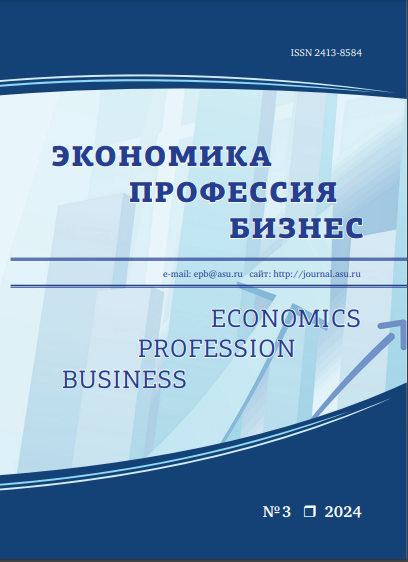SUSTAINABLE DEVELOPMENT OF RURAL AREAS: CONCEPTUAL AND METHODOLOGICAL FOUNDATIONS
УДК 332.145:502.131.1
Abstract
The development of rural areas that can be observed at the present time suggests the need to improve the conceptual framework in the context of sustainable transformation. The orientation of these localities towards the sustainable development agenda can make it possible to achieve socio-ecological and economic stability not only of the village, but also of the state as a whole. However, this requires a comprehensive analysis of the territorialdevelopment of rural areas and the construction of an algorithm for sustainable development. At the same time, this process is complicated by the fact that the collection of information necessary for conducting analytical procedures on the functioning of rural areas, on the achievement of sustainable development goals, on the results of the implementation of comprehensive development programs is not actually presented in the public domain oris too generalized. In this article, statistical data analyzed in detail to assess the stability of the functioning of rural areas, an attempt will be made to assess the achievement of sustainable development goals in these areas, and a conceptual model will be built, including the goal, objectives, tools and mechanisms for achieving environmental sustainability in rural areas, reflecting analytical algorithms. Data from rural areas of the Rostov region were used to carry out analytical prosedures.
Downloads
Metrics
References
Ирхина Л.Н., Хрестина С.Ф. Устойчивое развитие сельских территорий как реализация государственной политики // Вестник Нижегородской государственной сельскохозяйственной академии. 2020. №2 (26). С. 58–64.
Цветцых А.В., Шевцова Н.В. Устойчивое развитие сельских территорий: сбалансированная система показателей // Азимут научных исследований: экономика и управление. 2020. Т. 9. №2 (31). С. 366–370. DOI: 10.26140/anie-2020–0902–0088.
Бобер В.С. Аттрактивность и устойчивое развитие сельских территорий // Вестник Российского государственного аграрного заочного университета. 2022. №42 (47). С. 58–62.
Об утверждении Стратегии устойчивого развития сельских территорий Российской Федерации на период до 2030 года. URL: https://docs.cntd.ru/document/420251273/ (дата обращения: 01.05.2024).
Шеина С.Г., Федоровская А.А. Исследование влияния возобновляемых источников энергии на экологический потенциал территории субъекта РФ // Строительство и реконструкция. 2023. №3 (107). С. 122–130. DOI: 10.33979/2073–7416–2023–107–3–122–130.
Чиркова О.А. Прогнозирование реализации программ стратегического развития муниципального образования // Экономика Профессия Бизнес. 2024. №1. С. 110–115.
Медведева Л., Аверина А. Methodology for assessing the territory development in the context of sustainability // E3S Web of Conferences: XI International Scientific and Practical Conference Innovative Technologies in Environmental Science and Education (ITSE-2023), Divnomorskoe village, Russia, 04–10 сентября 2023 года. Vol. 431. Divnomorskoe village, Russia: EDP Sciences, 2023. P. 01026. DOI: 10.1051/e3sconf/202343101026.
Конаш Д.С., Дзись Ю.И. Устойчивое развитие сельских территорий Китая: тенденции и перспективы // Приднепровский научный вестник. 2022. Т. 1. №2. С. 36–47.
Шимук О.В. Устойчивое развитие сельских территорий: теоретические аспекты и способы измерения // Экономика устойчивого развития. 2023. №4 (56). С. 216–218. DOI: 10.37124/20799136_2023_4_56_216.
Ерин П.В., Толстова О.Н. Проектное управление и устойчивое развитие сельских территорий // Наука и Образование. 2022. Т. 5. №4. C. 1–14.
REFERENCES
Irkhina L.N., Khrestina S.F. Sustainable development of rural areas as an implementation of state policy. Bulletin of the Nizhny Novgorod State Agricultural Academy. 2020. No. 2 (26). Pp. 58–64.
Tsvetsykh A.V., Shevtsova N.V. Sustainable development of rural areas: a balanced system of indicators. Azimuth of scientific research: economics and management. 2020. Vol. 9. No. 2 (31). Pp. 366–370. DOI: 10.26140/anie-2020–0902–0088.
Bober V.S. Attractiveness and sustainable development of rural territories. Bulletin of the Russian State Agrarian Correspondence University. 2022. No. 42 (47). Pp. 58–62.
On approval of the Strategy for Sustainable Development of Rural Territories of the Russian Federation for the period until 2030. URL: https://docs.cntd.ru/document/420251273/ (date of access: 01.05.2024).
Sheina S.G., Fedorovskaya A.A. Study of the influence of renewable energy sources on the environmental potential of the territory of a constituent entity of the Russian Federation. Construction and reconstruction. 2023. No. 3 (107). Pp. 122–130. DOI: 10.33979/2073–7416–2023–107–3–122–130.
Chirkova O.A. Forecasting the implementation of strategic development programs of a municipality. Economics Profession Business. 2024. No. 1. Pp. 110–115.
Medvedeva L., AverinaA. Methodology for assessing the territory development in the context of sustainability. E3S Web of Conferences: XI International Scientific and Practical Conference Innovative Technologies in Environmental Science and Education (ITSE-2023), Divnomorskoe village, Russia, 04 — September 10, 2023. Vol. 431. Divnomorskoe village, Russia: EDP Sciences, 2023. P. 01026. DOI 10.1051/e3sconf/202343101026.
Konash D. S., Dzis Yu. I. Sustainable development of rural areas of China: trends and prospects. Pridneprovsky Scientific Bulletin. 2022. T. 1. No. 2. Pp. 36–47.
Shimuk O.V. Sustainable development of rural territories: theoretical aspects and methods of measurement. Economics of sustainable development. 2023. No. 4 (56). Pp. 216–218. DOI: 10.37124/20799136_2023_4_56_216.
Erin P.V., Tolstova O.N. Project management and sustainable development of rural areas. Science and Education. 2022. T. 5. No. 4. Pp. 1–14.
Economics Profession Business is a golden publisher, as we allow self-archiving, but most importantly we are fully transparent about your rights.
Authors may present and discuss their findings ahead of publication: at biological or scientific conferences, on preprint servers, in public databases, and in blogs, wikis, tweets, and other informal communication channels.
Economics Profession Business (EPB) allows authors to deposit manuscripts (currently under review or those for intended submission to EPB) in non-commercial, pre-print servers such as ArXiv.
Authors who publish with this journal agree to the following terms:
- Authors retain copyright and grant the journal right of first publication with the work simultaneously licensed under a Creative Commons Attribution License that allows others to share the work with an acknowledgement of the work's authorship and initial publication in this journal.
- Authors are able to enter into separate, additional contractual arrangements for the non-exclusive distribution of the journal's published version of the work (e.g., post it to an institutional repository or publish it in a book), with an acknowledgement of its initial publication in this journal.
- Authors are permitted and encouraged to post their work online (e.g., in institutional repositories or on their website) prior to and during the submission process, as it can lead to productive exchanges, as well as earlier and greater citation of published work (See The Effect of Open Access).









